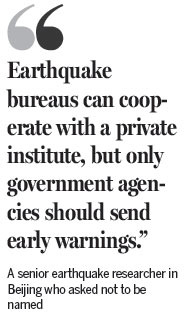False quake warning sent to cellphones
Updated: 2015-08-13 07:52
By Huang Zhiling in Chengdu(China Daily)
|
|||||||||||
Cellphone users with early-warning software for earthquakes were notified on Monday afternoon that a magnitude-6.0 quake had occurred in Beichuan, Sichuan province.
However, the quake never happened. The provider of the information, a private institute in Chengdu, said the message was a deliberate test, not a false alarm. But a senior quake researcher said that even if that were true, it was inappropriate to stage a drill without notice that could have caused panic and resulted in casualties.
A Chengdu resident, Li Ming, was surfing the Internet in a waiting room at a railway station in the city when a pop-up on his cellphone announced that an earthquake had taken place at 3:49 pm, and seismic waves would arrive in Chengdu in 35 seconds.
Dashing out of the station, he called a friend in Beichuan who said he had felt no tremors.
"I was embarrassed because a few passengers followed me out of the station," Li said.
At 5:27 pm, the China Seismographic Network said that Beichuan had not experienced an earthquake, and that the inaccurate information had come from the quake early-warning system provided by the Institute of Care-life in Chengdu. At 6:14 pm, the Sichuan provincial government information office confirmed the false alarm and asked people not to panic.

But institute founder Wang Tun responded that it wasn't a false alarm. The message was a planned drill to test people's response to an early earthquake warning.
"As the incidence of destructive quakes is much lower in Sichuan and neighboring Yunnan province this year than last, our institute conducted the drill to raise locals' awareness of quake prevention and to study how they would respond to a major quake," he said.
If the message was planned as a test, it was still inappropriate, said a senior earthquake researcher in Beijing who asked not to be named. Providing no advance warning to cellphone users harms the public, the researcher said, because turmoil could result.
"I have long upheld the idea that earthquake bureaus can cooperate with a private institute, but only government agencies should send early warnings," he said. "But China does not have a law on the issue."
China began attaching importance to early quake warnings after the Wenchuan earthquake in Sichuan in 2008. Care-life's Wang, a postdoctoral fellow of theoretical physics at the Austrian Academy of Sciences, set up his institute that year to conduct research into early-warning systems.
huangzhiling@chinadaily.com.cn
(China Daily 08/13/2015 page4)
Today's Top News
Yuan may stumble, but will not fall
Third Greek bailout deal submitted
to parliament
Pearson to sell 50% stake in Economist Group
Heatwave in Egypt kills at least 61
Chinese yuan extends sharp fall, long-term depreciation unlikely
A dwindling band of brothers
'Missile fragments' recovered from MH17 site
Beijing to close roads, metro stations for parade drill
Hot Topics
Lunar probe , China growth forecasts, Emission rules get tougher, China seen through 'colored lens', International board,
Editor's Picks

|

|

|

|

|

|






